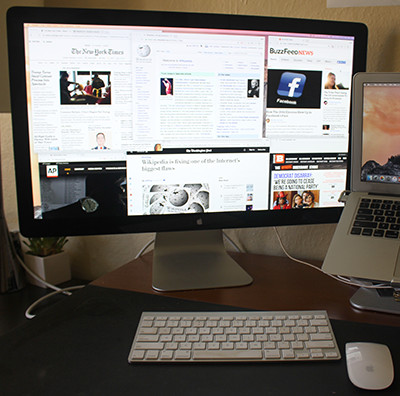The rapid expansion of fake news sites made real news headlines last week. The sheer prevalence of the viral stories has forced tech giants like Google and Facebook to think about how they handle fake news websites. Whether you think these sites are insidious attempts to sway elections or simply click bait to generate ad revenue, we can all agree they’re detrimental to society when people lack the media literacy skills to know the real from the fake.
That’s why the work Wiki Education does to help students develop media literacy skills is more important than ever.
We are actively teaching thousands of college students how to be media literate citizens each term. And we need your help to reach even more students.
 Here’s why what we do works: In our flagship program, we support college and university faculty who assign their students to write Wikipedia articles on course-related topics. In the process of researching a topic and writing about it, students in our program must follow Wikipedia’s rules for what sources they cite.
Here’s why what we do works: In our flagship program, we support college and university faculty who assign their students to write Wikipedia articles on course-related topics. In the process of researching a topic and writing about it, students in our program must follow Wikipedia’s rules for what sources they cite.
Wikipedia’s been dealing with fake news for years — and the community of Wikipedia writers and editors have a system that works. In order to be a valid source for a Wikipedia article, the news article in question must pass the “Reliable Sources” guideline on Wikipedia. This guideline asks the person writing the Wikipedia article (the “Wikipedian”) to consider: Is there editorial oversight for the content on that news site? Does the publication have a reputation for fact checking? Is the publication independent of the subject? Just because something is published online doesn’t mean it’s a reliable source for Wikipedia articles; instead, Wikipedians must look for things like the presence of an editorial board, whether the source issues corrections, and whether the source presents information neutrally. The community of volunteer editors tirelessly evaluate content added to Wikipedia, and remove facts not cited to a reliable source.
When we ask students to become Wikipedians for a term as part of our program, we teach them about source evaluation. We explain Wikipedia’s reliable source guideline, and we provide them information on how to determine what sources count as reliable for their fields. We tell them if they simply Google their topic and use the first few results as their sources without making a judgment call on the publisher’s validity, their work is likely to get deleted, so they must follow the rules in order to do well on this assignment.
In writing a Wikipedia article through Wiki Education’s program, students learn to be media literate and navigate an increasingly complex and often contentious media landscape.
Fostering these media literacy skills among our students means they’ll be able to question the validity of something they read online. They’ll have the skills to evaluate whether the article they’re reading and sharing on social media is reliable — or if it might not be. These media literacy skills are crucial for all students to learn, now even more than ever with the prevalence of these fake news sites.
We at Wiki Education want to teach more students these skills. We need your help:
- If you’re a college or university instructor, consider teaching with Wikipedia. We’re actively seeking new courses to participate in our program in the winter quarter and spring semester.
- If you’re able to support our work financially, consider donating online. Your support directly helps our organization provide assistance free of charge to instructors who want to give these students valuable media literacy skills.
- If you want to help us spread the word, consider sharing this post on your social media. Use your networks to share why our work to give students media literacy skills is so important.

Yes, this is an extremely important development and I really do hope this shall get proceeded so ‘the news’ will really BE the news. And not any political brainwashing. There is enough fooling and disturbing of the normal, healthy developments. Yes, I’ll vote for this.